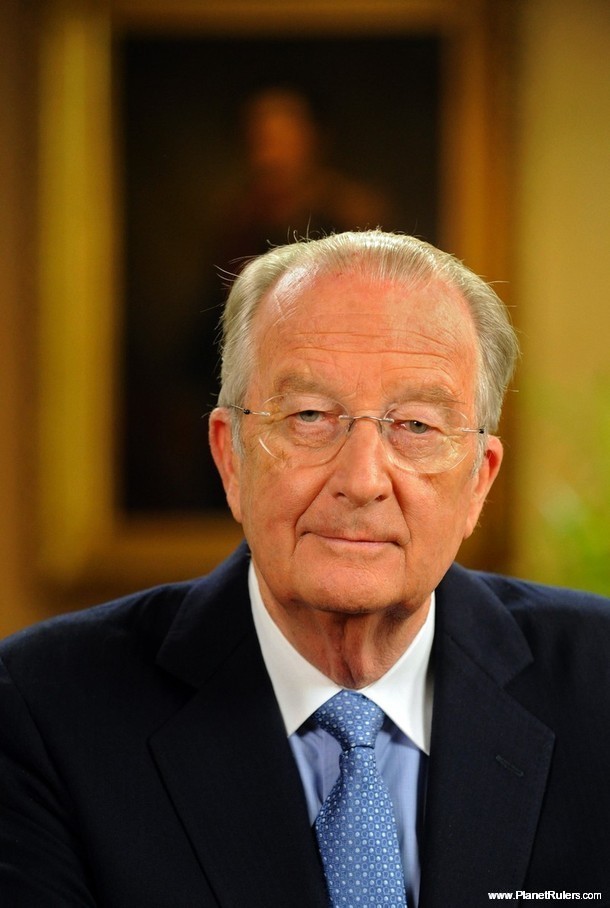

King Albert II, King of Belgium
Philippe was born on 15 April 1960 during the reign of his uncle, King Baudouin of Belgium. His father, Prince Albert, Prince of Liège (later King Albert II) was the second son of King Leopold III of Belgium and a younger brother of Baudouin. His mother, Paola, Princess of Liège (later Queen Paola), is a daughter of Italian aristocrat Fulco VIII, Prince Ruffo di Calabria, 6th Duke of Guardia Lombarda. His mother descends from the French House of La Fayette, and the king is a descendant of Gilbert du Motier, marquis de Lafayette and Marie Adrienne Françoise de Noailles.
He was born at the Belvédère Castle in Laeken north of Brussels. He was baptised one month later at the church of Saint Jacques-sur-Coudenberg in Brussels on 17 May,[1] and named Philippe after his great-great-grandfather Prince Philippe, Count of Flanders. His godparents were his paternal grandfather, King Leopold III, and his maternal grandmother, Donna Luisa, Princess Ruffo di Calabria.
Source: https://en.wikipedia.org/wiki/Philippe_of_Belgium
King Albert II was born in Brussels, at the Chateau of Stuyvenberg, on 6 June 1934.
King Albert II, who was given the title of “Prince of Liège” on birth, is the son of King Leopold III and of Queen Astrid, born Princess of Sweden. He is the grandson of King Albert I and of Queen Elisabeth.
On 29 August 1935, the Prince of Liège lost his mother, Queen Astrid, who died in a car accident at Küssnacht, Switzerland.
On 10 May 1940, at the time when Belgium was being invaded, Prince Albert, his elder sister Princess Josephine-Charlotte and his elder brother Prince Baudouin, left the country for France and later Spain. The Prince and the Princess returned to Belgium on 2 August 1940.
They continued their studies until 1944, either at Laeken, or at the Chateau of Ciergnon in the Ardennes. In June 1944, at the time of the Allied landings, Leopold III, Princess Lilian – who he married in 1941 – and the royal children were deported by the Germans to Hirschstein in Germany, and later to Strobl in Austria, where they were liberated by the American Army on 7 May 1945. Due to the political situation in Belgium, King Leopold and his family moved to the villa “Le Reposoir” in Pregny, Switzerland, when they left Austria in October 1945. They would stay there until July 1950. During that time, Prince Albert would continue his education in a secondary school in Geneva.
King Leopold III, accompanied by Prince Baudouin and Prince Albert, returned to Belgium on 22 July 1950.
King Albert II On 2 July 1959, Prince Albert married Donna Paola Ruffo di Calabria, born of a princely family in Italy. King Albert II and Queen Paola have three children: Prince Philippe (born on 15 April 1960), Princess Astrid (born on 5 June 1962) and Prince Laurent (born on 19 October 1963).
Prince Albert was asked in 1962 to exercise the function of Honorary President of the Board of Directors of the Belgian Foreign Trade Office, which he performed for 31 years. In this capacity, he presided over a hundred trade missions throughout the world and made many visits to Belgian companies operating in the export field.
To pay tribute to the Prince who made such an active contribution to boosting foreign trade over all those years, a Prince Albert Fund for training foreign trade specialists was set up in 1984.
Moreover, Prince Albert also assumed the Presidency of the Board of the Caisse Générale d’Epargne et de Retraite from 1954 to 1992. He was President of the Belgian Red Cross from 1958 to 1993.
Apart from these various functions, Prince Albert carried out actions in the field of town planning, housing, nature conservation, listed monuments and sites, and in general, management of the environment. In this context, he has presided or attended many international conferences. In 1969, he was invited by the Council of Europe to assume the Presidency of the European Ministerial Conference on the protection of the cultural and architectural heritage.
After the death of his brother, King Baudouin, Prince Albert was sworn in before the combined chambers of parliament on 9 August 1993 as the sixth King of the Belgians.
Source: http://www.monarchie.be/royal-family/king-albert-ii
Rishi Sunak, Prime Minister of the United Kingdom (since Oct 25, 2022) Rishi Sunak (born…
Giorgia Meloni, Prime Minister of Italy (since Oct 22, 2022) Giorgia Meloni (born 15 January…
Mahamat Déby, President of Chad (since Oct 10, 2022) Mahamat Idriss Déby Itno (born 1…
João Lourenço, President of Angola (sworn in on Sept 26, 2017) Sworn in for his…
William Ruto, President of Kenya (elected on Aug 9, 2022 with 50.5% of the vote)…
Gustavo Petro, President of Colombia (since Aug 7, 2022) Gustavo Francisco Petro Urrego ODB ODSC…
This website uses cookies.